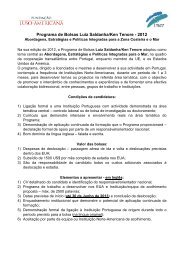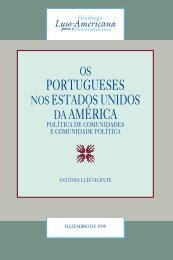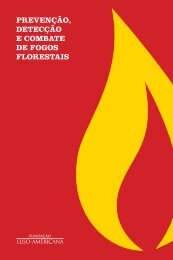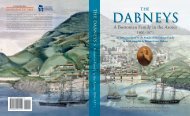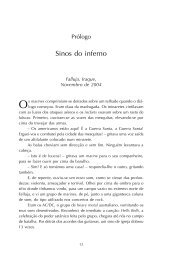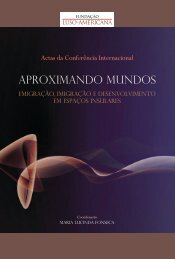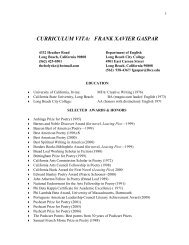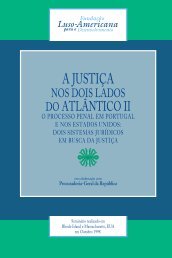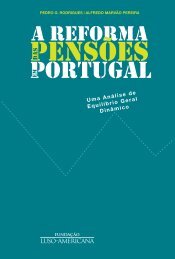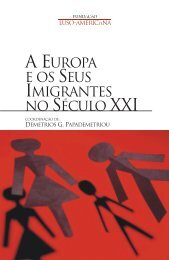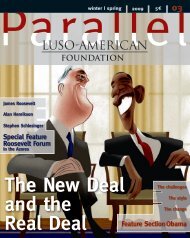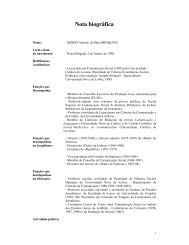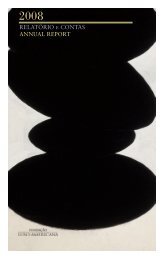A decade later - Fundação Luso-Americana
A decade later - Fundação Luso-Americana
A decade later - Fundação Luso-Americana
Create successful ePaper yourself
Turn your PDF publications into a flip-book with our unique Google optimized e-Paper software.
The simple, spartan dinner table, where the Ledig House guests<br />
enjoyed meals cooked by their portuguese chef.<br />
‘ There was a critic from the Wine spectator<br />
in our group, so the stakes were high,<br />
but the portuguese wines got two<br />
thumbs up.<br />
moreiras<br />
’ paulo<br />
– can ultimately be worth three or four<br />
times that. “A blessing,” as Paulo Moreiras<br />
would say. Luísa Costa Gomes adds, “For<br />
me it was moving to hear someone say,<br />
‘tell us what you need and we’ll get it for<br />
you; your job is to write.’ A woman<br />
doesn’t get to hear that very often. At one<br />
point, I was craving fresh blueberries, and<br />
I always had a stock of them in the fridge!<br />
It was ‘Old Jim’ and his son who did the<br />
shopping. There was a day when a bunch<br />
of us – women writers and poets – had<br />
to go off to the mall, because we missed<br />
going to the supermarket.”<br />
In addition to all the free time, which<br />
she dubbed “extremely beneficial,” Luísa<br />
Costa Gomes recalls how the management<br />
of the Ledig House always made themselves<br />
available: D.W. Gibson (“Young, cultured,<br />
cheerful, happy, committed, and affectionate”),<br />
who organized the activities and was<br />
the intermediary between the institution<br />
and the residents; and the cook who had<br />
a Portuguese background, Rita Soares-Kern.<br />
She was also taken by the “austere comfort”<br />
of the house, the “old, bare-bones furni-<br />
cuLTure<br />
ture, lots of windows, lots of trees, and lots<br />
of wild critters. You almost feel like a real<br />
American author.”<br />
Paulo Moreiras also won’t forget Rita<br />
Soares-Kern. The author’s penchant for fine<br />
food (a redeeming quality rather than a<br />
fault) is no secret. “I learned a lot of tricks<br />
and exchanged loads of recipes with Rita,”<br />
the author of elogio da Ginja tells us. D.W.<br />
Gibson confirms the fact: “He would help<br />
her out a lot and we got used to seeing him<br />
in the kitchen. He’s a great example of community<br />
spirit at work in Ledig House.” The<br />
crowning glory, Paulo Moreiras tells us, was<br />
a collectively cooked dinner of fava beans<br />
with smoked sausage, pork-belly, and bottles<br />
of Portuguese wine they serendipitously<br />
came across in a nearby store. “There was<br />
a critic from the Wine Spectator in our group,<br />
so the stakes were high, but the Portuguese<br />
wines got two thumbs up.”<br />
Aside from the group dinners, a diplomatic<br />
obligation that soon turned into a<br />
source of pleasure and even an informal<br />
kind of group therapy (at the end of a day<br />
of routine, the writers and translators were<br />
‘ Being so far away helped a lot, especially<br />
before the writing stage when i’m putting<br />
my ideas together and thinking things over,<br />
because it provides you with a mindset<br />
different from the one you’d have ordinarily.<br />
’<br />
david machado<br />
“An awesome experience,” is how paulo moreiras (left)<br />
describes his stay at the writer’s retreat.<br />
able to share their doubts and dilemmas),<br />
on the weekends the Ledig House held<br />
informal get-togethers with guests from<br />
the New York publishing world. It was<br />
this spirit of literary give-and-take that<br />
led to the founding of the House, which<br />
was based on the efforts of German publisher<br />
Heinrich Maria Ledig-Rowohlt, who<br />
lent his name to the retreat. The resident<br />
writers and translators –never more than<br />
ten at a time – also have to present work<br />
before the local community. “When I took<br />
part in a public reading, I realized how<br />
much curiosity and interest there was in<br />
the Portuguese language,” Paulo Moreiras<br />
says. The hardest part may be going home,<br />
despite how much the writers miss their<br />
families and the taste of delicious plate of<br />
salt cod. The author of Os Dias Saturno had<br />
a harder time with the jet lag coming<br />
back. “But after two weeks, I started working<br />
again full throttle, but I missed that<br />
magnificent experience.” On this score,<br />
all the writers agree. After all, without<br />
experiencing life, there’s really nothing to<br />
write.<br />
Parallel no. 6 | FALL | WINTER 2011 77<br />
DR<br />
DR



